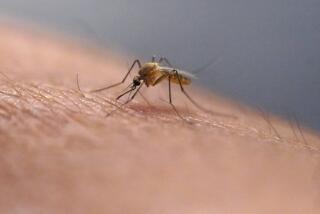Transfusions Can Spread West Nile, Officials Say
- Share via
As the infections and death toll attributed to West Nile virus rise by the day, federal health officials said Thursday they are reasonably certain that the virus can be spread through blood transfusions.
They also warned that West Nile patients can develop a polio-like paralysis that is easily misdiagnosed and improperly treated.
The new information has created urgency within the public health community to address a disease that didn’t even appear in the United States until 1999. This year alone, 84 people have died and 1,745 people have become ill in more than 30 states and the District of Columbia.
California has reported one locally acquired infection, in a young woman in Los Angeles County who has recovered.
West Nile disease remains rare, however. Although as many as 200,000 people are estimated to have been infected nationally, four in five infected people don’t develop symptoms.
Elderly people are most vulnerable to the disease, which normally is harbored by birds and spread by mosquito bites.
Officials from the U.S. Food and Drug Administration and the U.S. Centers for Disease Control and Prevention, are investigating four cases of possible West Nile transmission through transfusions from the general blood supply.
In one case, they are fairly sure that a 24-year-old Mississippi woman became infected through a transfusion because three of her blood donors also tested positive and one became ill a few days after giving blood.
One transfusion recipient, a 77-year-old man, died of encephalitis caused by West Nile virus.
The officials said they are “urgently” working with blood banks and the makers of diagnostic tests to find a way to accurately and quickly screen for West Nile in the general blood supply.
“While the investigations are ongoing, we believe there’s sufficient evidence, when you put it all together, to say that there is likely a risk” posed by blood transfusions, said Dr. Jesse Goodman, a senior official at the FDA’s Center for Biologics Evaluation and Research on Thursday.
In a telephone news conference, Goodman said patients should discuss the risk with their physicians and potentially delay elective surgery or donate units of their own blood in advance to be used if transfusions are needed.
Health officials took pains not to discourage people from giving or receiving necessary blood transfusions. Each year, about 4.5 million people in the United States receive blood products, which can be life-saving.
“For people who need a transfusion or transplant, the potential benefits will outweigh the risks, including the risk of West Nile virus infection,” Goodman said.
People cannot contract West Nile by giving blood.
The FDA also is encouraging blood banks to ask that donors notify them if they develop fevers or flu-like illnesses after donating blood so that the blood can be immediately removed from the general supply.
One big problem, Goodman and others said, is that there is no practical method available to test for West Nile in the blood supply. Tests that detect antibodies--or the body’s immune response to the virus--aren’t necessarily accurate because antibodies take time to develop after the virus enters the blood.
One possible solution is to find a blood test that detects the genetic material from the virus itself. Such tests are still being studied, but Goodman said, “we can’t just implement [it] overnight.”
The tests will also need to be more sensitive than those for HIV and hepatitis, because it appears that levels of West Nile in the blood are far lower.
Another technology being reviewed by the FDA, called pathogen inactivation, kills potential infecting agents--perhaps including West Nile--in blood products. Goodman said his agency has been working with manufacturers to evaluate its potential effectiveness and safety.
Also Thursday, officials said they had found six cases of paralysis resulting from West Nile infection. Although the risk of paralysis had been reported previously, officials said those cases had been misdiagnosed as stroke or another neurological ailment, Guillain-Barre syndrome.
The cases involved three men from Mississippi, ages 50, 56 and 57, and three people from Louisiana--a 56-year-old man, a 46-year-old man and a 69-year-old woman, all diagnosed in July and August.
Health officials encouraged doctors to perform diagnostic tests to differentiate between West Nile-induced paralysis and Guillain-Barre syndrome, which also causes an inability to move the limbs. The distinction is important because Guillain-Barre patients receive treatments that don’t help, and may even hurt, West Nile patients.
Patients who experience West-Nile-related paralysis typically are not in pain and can still feel sensation in their affected limbs. Also, this paralysis affects only one side of the body; Guillain-Barre generally affects both sides of the body.
Doctors have been observing some of the patients for more than a month, “and they have shown very little improvement,” said Dr. Jim Sejvar, a medical epidemiologist with CDC.
More typically, West Nile virus has been linked to meningitis, an irritation of the brain’s membranes, or to encephalitis, an inflammation of the brain.
In another development announced Thursday, federal health authorities identified a fifth case in which the virus may have been transmitted through organ transplantation. A 47-year-old man became sick with encephalitis weeks after receiving a liver transplant on Aug. 14. But authorities do not know if he received the disease from the transplant, a mosquito bite or the 39 units of transfused blood he got in the seven days after his transplant.
Previously, the CDC confirmed that four people contracted the virus after receiving organs from an infected Georgia woman, who died of injuries from an automobile accident. Authorities do not know how the donor contracted West Nile. She had, however, received blood transfusions from 63 different donors before her death.
CDC officials said their “best evidence” suggests that West Nile has peaked in the southern United States, but one expert said that “a significant number of infections are still occurring, and people have to be vigilant to avoid mosquito bites.”
More to Read
Sign up for Essential California
The most important California stories and recommendations in your inbox every morning.
You may occasionally receive promotional content from the Los Angeles Times.













